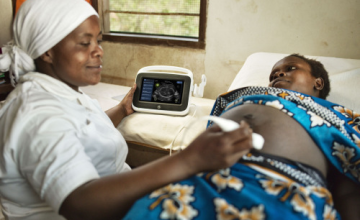Couples first. That’s the policy that clinics in Uganda have adopted to encourage fathers to accompany expectant mothers for their check-ups. Women who turn up alone often find themselves at the back of the queue.

Bella Kasigaire is four months pregnant. She hops on a bicycle taxi or boda boda to reach Kawolo hospital in Buikwe district. Her husband has never set foot in the hospital to attend the antenatal check-ups for any of her pregnancies.
A newly launched report by the Gates Foundation tracks improvements in tackling health issues, such as malaria, AIDS and maternal and child mortality, that devastate many of the world’s poorest countries. (13.09.2017)
Abortion is illegal in Tanzania and is punishable by up to 14 years imprisonment. But hospital data suggests that hundreds of women still undergo abortions in secret. One woman told DW her story. (13.01.2016)
“You know, men today are very complicated. He impregnates you, but you go to the hospital alone,” she said. “The nurses always ask: Where is your husband? So I just find a bicycle taxi driver and we plan what they are going to ask him.”
“It’s risky, taking other men to the clinic,” she added, “but what can you do?”
Scholastic Namuddu is a maternal health service provider with the non-governmental organization Reproductive Health Uganda. According to her, many men, especially in rural areas, neglect their responsibilities, in the form of attending the clinics with the expectant mothers.
Bragging’s not enough
Sheena Ayebare, another mother, says many women experience the problem. “There are some men we call ‘sperm donors.’ He just comes, he ‘donates’ his sperm in you and then you start suffering,” Ayebare said. “They are there saying: I am soon becoming a father. Then when they start seeing the pregnancy, they start fearing,” she added. “The man who has been coming early to be with you before you became pregnant, starts coming home late. And you start wondering, what’s happening?”
Of course, not all pregnancies take this turn. And while the drive to include men in the process is widely seen as a positive move, some men argue that they just don’t have time to visit the antenatal clinics.
Victor Kiwalabye, a father of two, says that he takes his wife to the hospital but has no time to stay for the check-up. “The problem is, when I go to the hospital the lines are long and I have little time. I have to look for money,” he said. “Secondly, people in the hospital also want money. I feel I want to be there but I have to go and look for money.”
Uganda’s ministry of health, however, is not deterred. Spokesperson Vivian Nakaliika says that the government has devised measures to address challenges in reproductive health. “We have devised means to engage men. We go down to the grass roots, we go to communities, we work with village health teams and local council authorities to ensure that this message sinks in.”
Of course, not all pregnancies take this turn. And while the drive to include men in the process is widely seen as a positive move, some men argue that they just don’t have time to visit the antenatal clinics.
Victor Kiwalabye, a father of two, says that he takes his wife to the hospital but has no time to stay for the check-up. “The problem is, when I go to the hospital the lines are long and I have little time. I have to look for money,” he said. “Secondly, people in the hospital also want money. I feel I want to be there but I have to go and look for money.”
Uganda’s ministry of health, however, is not deterred. Spokesperson Vivian Nakaliika says that the government has devised measures to address challenges in reproductive health. “We have devised means to engage men. We go down to the grassroots, we go to communities, we work with village health teams and local council authorities to ensure that this message sinks in.”
She claimed that they have observed a rise in the involvement of men. The work, however, is far from finished.

